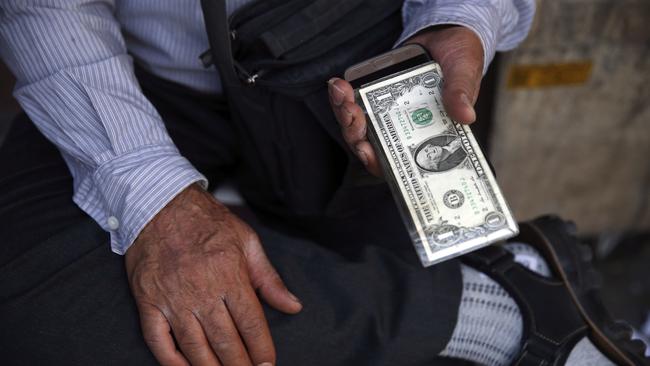Tehran’s best bet to rework nuke deal
The currency is falling and inflation is rising as renewed sanctions loom.

Donald Trump said yesterday he would meet Iranian President Hassan Rouhani with “no preconditions”, and after meetings with Kim Jong-un and Vladimir Putin this was probably only a matter of time.
Trump has preternatural confidence in his negotiating ability — and every other ability. But give Trump credit for noticing at the same time that Iran’s regime is “having a hard time right now”, for which he can take some credit.
Tehran is struggling to control capital flight as Iranians anticipate the reimposition of US sanctions, starting next week.
On Monday (yesterday, AEST) the local currency, the rial, hit 119,000 against the dollar on the black market, a new low.
Economist Steve Hanke, who follows global exchange rates, says Iran’s annual inflation rate is 221 per cent. This isn’t Zimbabwe inflation, but it is causing Iranians to want to hold assets like gold, not the increasingly worthless rial.
Trump announced in May that the US would withdraw from Barack Obama’s 2015 nuclear deal and reimpose sanctions, after a grace period for companies to wind down their business in Iran.
Many European companies that had rushed in after the nuclear deal are now closing shop.
Officials like Treasury under-secretary Sigal Mandelker have explained clearly and often how the sanctions will punish Iran for illicit activities, such as funding the Iran Revolutionary Guard Corp’s terrorist activities in Syria, or its support for Lebanese Hezbollah.
All of which is putting a strain on Rouhani, who is taking political heat from Supreme Leader Ali Khamenei and the other ruling mullahs for the economic troubles.
Rouhani fired the country’s central bank governor last week and replaced him with Abdolnaser Hemmati, an official who formerly worked for Bank Melli, a state-owned institution that the US and the EU previously sanctioned for bankrolling Tehran’s nuclear and ballistic-missile activities.
Our sources say Iranian authorities arrested blackmarket currency dealers in Tehran on Monday, which will further spook markets.
Shooting the messengers usually does — and in this case the shooting could get literal.
Iranians have been protesting periodically around the country about the economic mess, and they aren’t blaming the Trump administration. If Rouhani wants to end sanctions, his best move would be to take Trump up on his offer and renegotiate the terms of the nuclear deal.
The Wall Street Journal



To join the conversation, please log in. Don't have an account? Register
Join the conversation, you are commenting as Logout